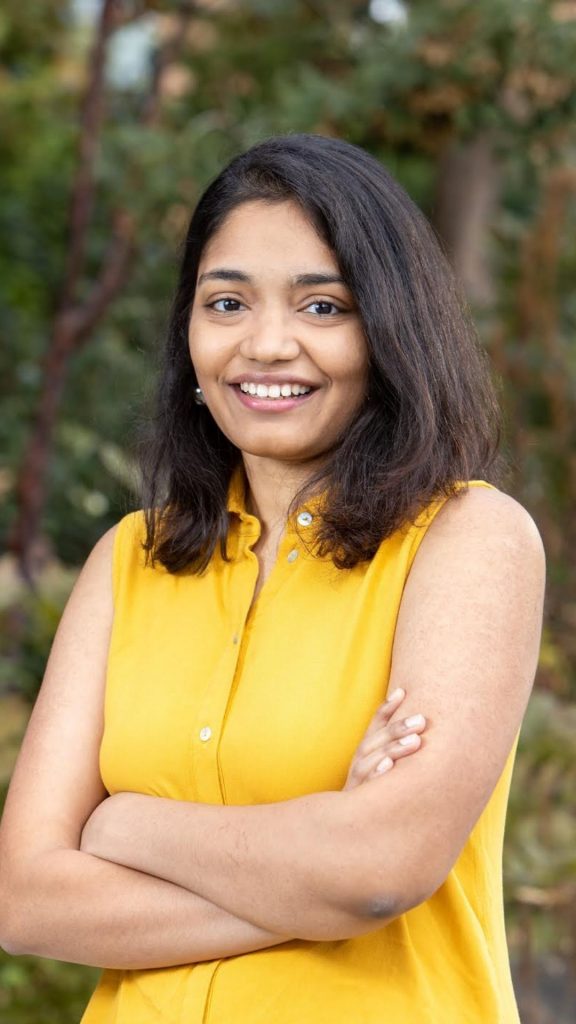
Manaswi Saha, a Ph.D. student working with Allen School professor Jon Froehlich, has been named a 2020 Google Ph.D. Fellow for her work in human computer interaction focused on assistive technologies and artificial intelligence for social good. Her research focuses on collecting data and building tools that can improve the understanding of urban accessibility and serve as a mechanism for advocacy, urban planning, and policymaking.
Saha, who is one of 53 students throughout the world to be selected for a Google Fellowship, will use those tools to fill an informational gap between citizens and the local government and stakeholders showing where improvements in sidewalks need to be made to make them accessible to all.
“Since the beginning of my academic career, my research interests have been towards socially impactful projects. Public service, especially for underrepresented communities, runs in my family,” Saha said. “The driving force for the work I do stems from my role model, my father, who dedicated his life towards rural and agricultural development in India. His selfless efforts inspired me to explore how technology can be used for the betterment of society. With this goal in mind, I set out to do my Ph.D. with a focus on high-value social problems.”
Saha works with Froehlich in the Makeability Lab on one of its flagship ventures, Project Sidewalk. The project has two goals: to develop and study data collection methods for acquiring street-level accessibility information using crowdsourcing, machine learning, and online map imagery and to design and develop navigation and map tools for accessibility.
To start, Saha led the pilot deployment of the Project Sidewalk tool for data collection in Washington DC. During the 18-month study, which consisted of 800 volunteers collecting sidewalk accessibility labels in Washington, D.C., crowdworkers virtually walked city streets using Google Street View and remotely reported on pedestrian-related accessibility problems such as missing curb ramps, cracked sidewalks, missing sidewalks and obstacles. Saha was the lead author on the paper presenting the team’s work, Project Sidewalk: A Web-based Crowdsourcing Tool for Collecting Sidewalk Accessibility Data At Scale, which earned a Best Paper Award at CHI 2019.
“Because Project Sidewalk is publicly deployed, the tool must work robustly — so code is carefully tested and reviewed — a somewhat slow and arduous process, particularly for academics used to building fast research prototypes,” Froehlich said. “Project Sidewalk is not an easy project; however, Manaswi performed admirably. As lead graduate student, Manaswi helped co-manage the team of students, ideate, design, and implement new features, brainstorm research questions and corresponding study protocols, and help execute the studies themselves.”
Since the initial data was completed — and is also being gathered currently in Seattle; Newburg, Oregon, Columbus, Ohio; and Mexico City and San Pedro Garza García in Mexico, Saha conducted a formative study to understand visualization needs. She is using what she learns to build an interactive web visualization tool that will answer questions about accessibility for a variety of stakeholders, including people with mobility disabilities, caregivers, local government officials, policymakers, and accessibility advocates. The tools will allow cities to see where they need to allocate resources to resolve the lack of accessibility. Saha won an Amazon Catalyst Award last year to help fund this research.
Additionally, Saha has conducted research going beyond looking at the physical barriers challenging people with disabilities to also understand the socio-political challenges that impede accessible infrastructure development. She will publish and present a paper detailing her findings later this month at the 23rd ACM Conference on Computer-Supported Cooperative Work and Social Computing.
Saha also authored a paper that appeared at last year’s ACM SIGACCESS Conference on Computers and Accessibility (ASSETS 2019) on shortcomings in GPS wayfinding tools that lead to problems for visually impaired pedestrians. Saha and her collaborators found that while users can get to a desired vicinity, they often struggle to find the exact location because the GPS tools are not specific enough. The paper, which Saha worked on while an intern at Microsoft Research, addressed this challenge, along with exploring implications for future systems to support precise navigation for people with visual impairments.
In addition to being a student and researcher, Saha is a teaching assistant (CSE482A: Capstone Software Design to Empower Underserved Populations; CSE599H: Crowdsourcing, Citizen Science, and Large-scale Online Experimentation; CSE599S: The Future of Access Technologies; CSE441: Advanced HCI: Advanced User Interface Design, Prototyping, And Evaluation; CSE440: Introduction to HCI), a volunteer (CHI ‘16, CHI ‘18 and Girls Who Code at Adobe) and a mentor to undergraduate researchers.
Since 2009, the Google Ph.D. Fellowship program has recognized and supported exceptional graduate students working in core and emerging areas of computer science. Previous Allen School recipients include Hao Peng (2019), Joseph Redmon (2018), Tianqi Chen and Arvind Satyanarayan (2016), Aaron Parks and Kyle Rector (2015) and Robert Gens and Vincent Liu (2014). Learn more about the 2020 Google Fellowships here.
Congratulations, Manaswi — and thanks for all of your contributions to the Allen School community!

